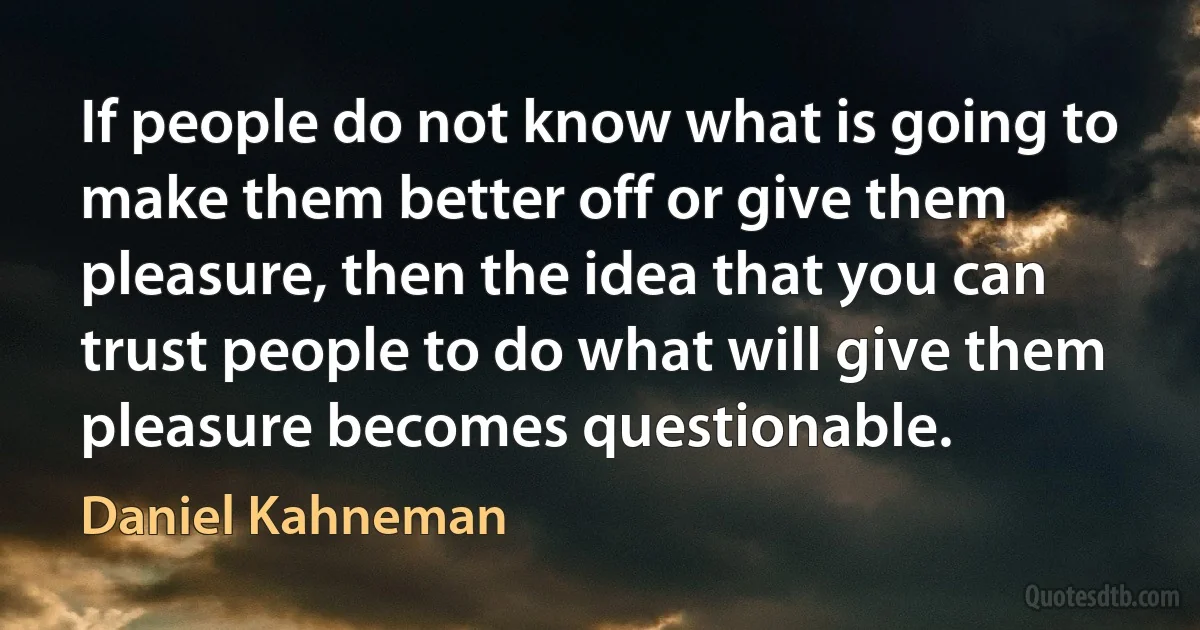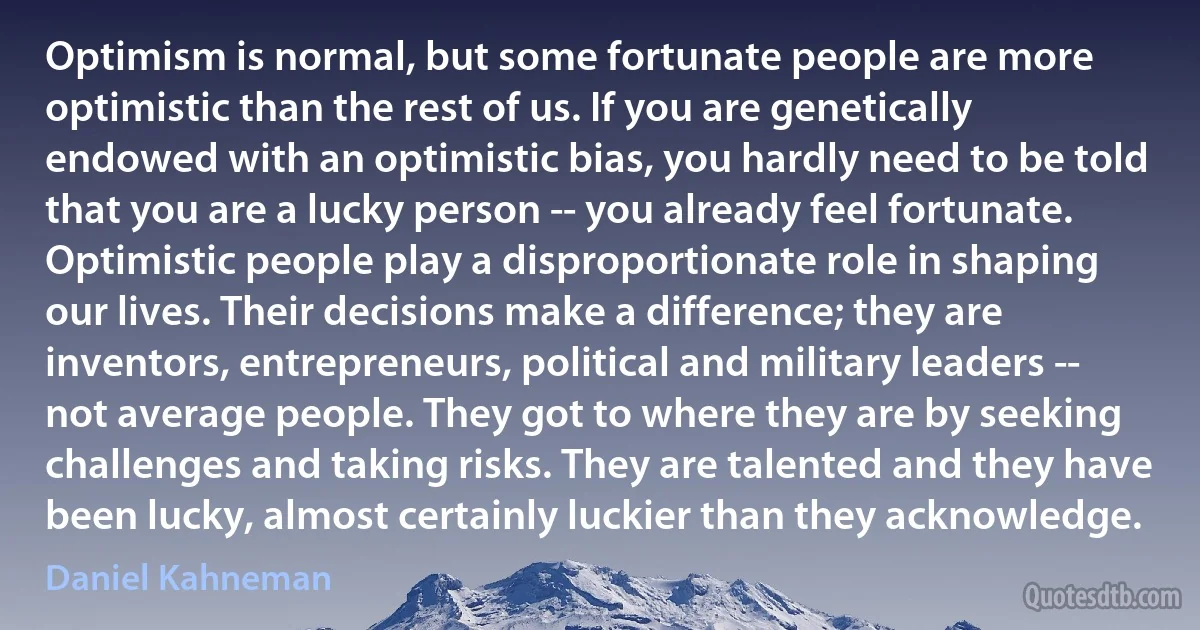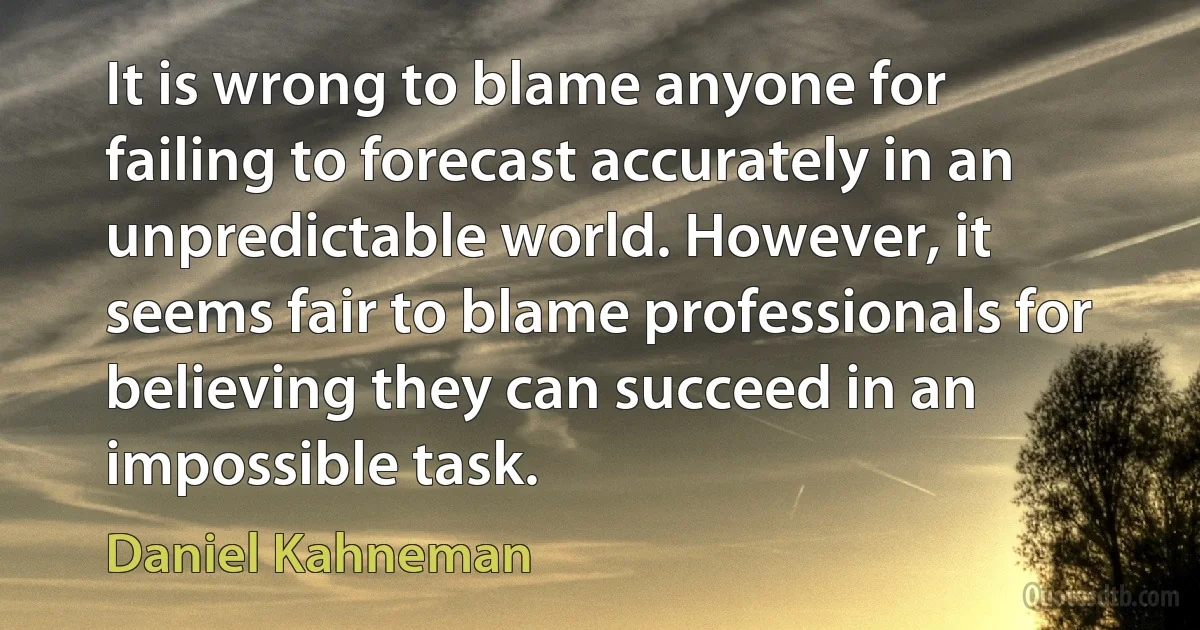Daniel Kahneman quotes - page 2
The mystery is how a conception that is vulnerable to such obvious counterexamples survived for so long. I can explain it only by a weakness of the scholarly mind that I have often observed in myself. I call it theory-induced blindness: Once you have accepted a theory, it is extraordinarily difficult to notice its flaws. As the psychologist Daniel Gilbert has observed, disbelieving is hard work.

Daniel Kahneman
Most of us view the world as more benign than it really is, our own attributes as more favorable than they truly are, and the goals we adopt as more achievable than they are likely to be. We also tend to exaggerate our ability to forecast the future, which fosters overconfidence. In terms of its consequences for decisions, the optimistic bias may well be the most significant cognitive bias. Because optimistic bias is both a blessing and a risk, you should be both happy and wary if you are temperamentally optimistic.

Daniel Kahneman
The confidence we experience as we make a judgment is not a reasoned evaluation of the probability that it is right. Confidence is a feeling, one determined mostly by the coherence of the story and by the ease with which it comes to mind, even when the evidence for the story is sparse and unreliable. The bias toward coherence favors overconfidence. An individual who expresses high confidence probably has a good story, which may or may not be true.

Daniel Kahneman
Caring for people often takes the form of concern for the quality of their stories, not for their feelings. Indeed, we can be deeply moved even by events that change the stories of people already dead. We feel pity for a man who died believing in his wife's love for him when we hear that she had a lover for many years and stayed with her husband only for his money. We pity the husband although he had lived a happy life. We feel the humiliation of a scientist who made a discovery that was proved false after she died, although she did not feel the humiliation. Most important, we all care intensely for the narrative of our own life and very much want it to be a good story, with a decent hero.

Daniel Kahneman
Subjective confidence in a judgement is not a reasoned evaluation of the probability that this judgement is correct. Confidence is a feeling, which reflects the coherence of the information and the cognitive ease of processing it. It is wise to take admissions of uncertainty seriously, but declarations of high confidence mainly tell you that an individual has constructed a coherent story in his mind, not necessarily that the story is true.

Daniel Kahneman
The lesson is clear: estimates of causes of death are warped by media coverage. [...] The world in our heads is not a precise replica of reality; our expectations about the frequency of events are distorted by the prevalence and emotional intensity of the messages to which we are exposed.

Daniel Kahneman
It took Francis Galton several years to figure out that correlation and regression are not two concepts – they are different perspectives on the same concept. The general rule is straightforward but has surprising consequences: whenever the correlation between two scores is imperfect, there will be regression to the mean.

Daniel Kahneman
We often interact with professionals who exercise their judgment with evident confidence, sometimes priding themselves on the power of their intuition. In a world rife with illusions of validity and skill, can we trust them? How do we distinguish the justified confidence of experts from the sincere overconfidence of professionals who do not know they are out of their depth? We can believe an expert who admits uncertainty but cannot take expressions of high confidence at face value. As I first learned on the obstacle field, people come up with coherent stories and confident predictions even when they know little or nothing. Overconfidence arises because people are often blind to their own blindness.

Daniel Kahneman
Many unfortunate human situations unfold [...] where people who face very bad options take desperate gambles, accepting a high probability of making things worse in exchange for a small hope of avoiding a large loss. Risk taking of this kind often turns manageable failures into disasters.

Daniel Kahneman
A plausible interpretation is that higher income is associated with a reduced ability to enjoy the small pleasures of life. [...] There is a clear contrast between the effects of income on experienced well-being and in life satisfaction. Higher income brings with it higher satisfaction, well beyond the point at which it ceases to have any positive effect on experience. [...] Life satisfaction is not a flawed measure of their experienced well-being, as I thought some years ago. It is something else entirely.

Daniel Kahneman



